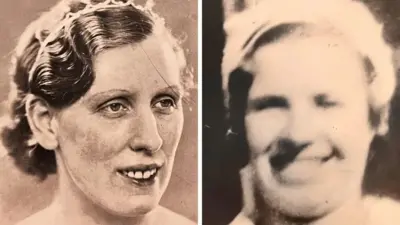We've updated our Privacy and Cookies Policy
We've made some important changes to our Privacy and Cookies Policy and we want you to know what this means for you and your data.
Malignant melanoma: Big rise among over-50s in Wales
Four times as many people in their 50s in Wales are now diagnosed with the worst form of skin cancer as 30 years ago, research suggests.
Cancer Research UK said the increase in malignant melanoma rates could reflect tanning behaviour in the 1970s era of cheap package holidays and sunbeds.
It said Wales has seen one of the biggest increases in the UK.
"It's possible that in Wales people are less aware of the dangers or have had a higher exposure," said a spokeswoman.
Cancer Research UK said its figures show there are currently about 27 cases of malignant melanoma per 100,000 people in the 50-59 age group in Wales.
This compared to around six people per 100,000 at the end of the 1970s, the charity said.
Malignant melanoma is now the fifth most common cancer among people in their 50s in Wales, while it was the 19th most common 30 years ago, the charity added.
Yinka Ebo, senior health information officer with Cancer Research UK, said the charity did not know the exact reasons behind the dramatic increase.
But she said: "We can perhaps single out one reason.
"It could have something to do with a change in tanning culture.
"In the 1970s there was an explosion of cheap package holidays and also the introduction of sunbeds.
"Malignant melanoma, like many cancers, can take years or decades to develop, so these figures could be a result of past behaviour."
Ms Ebo said that 30 years ago there had been less awareness of the need to protect the skin from the sun.
"This was when today's over-50s were in their teens or 20s, so it could be a reflection of that," she said.
"However, there has been an increase across all age groups."
Ms Ebo said the figures showed that Wales had seen one of the highest increases across the UK.
"The figures tell us about the numbers being diagnosed with malignant melanoma. What they do not tell us is why.
"We know what the main causes of skin cancer are - exposure to UV and sunbeds."
Cancer Research UK is working with Tesco to launch a new leaflet campaign to raise awareness of the early signs of malignant melanoma.
Karen Davies, of the charity, said: "If people are diagnosed when the cancer is in the early stages, before it has had a chance to spread around the body, treatment is more likely to be successful.
"Through our campaign with Tesco, we want to highlight the signs and symptoms of skin cancer and encourage people to visit their doctor promptly if they notice any unusual changes in their skin."
The Welsh government said its Cancer Delivery Plan, published in June, had stressed the importance of individuals taking responsibility for their health where possible.
A spokesman said: "We know people can reduce their risk of cancer by changing their lifestyles: not drinking as much alcohol; stopping smoking; improving their diet; increasing levels of physical activity, and taking steps to protect themselves from sun damage.
He added: "Wales has the highest rate of improved survival in the UK in recent years, with uptake of cancer screening programmes here among the highest in Europe."
Top Stories
More to explore
Most read
Content is not available








